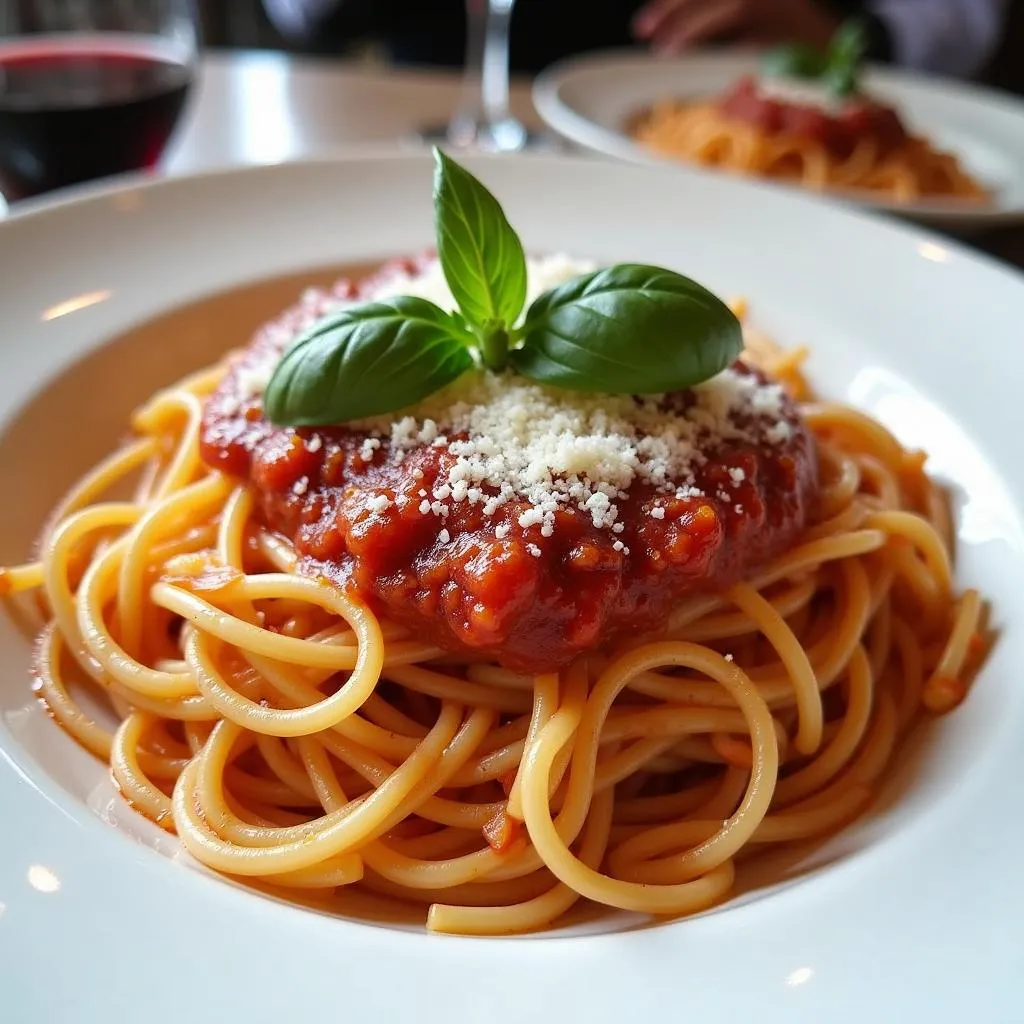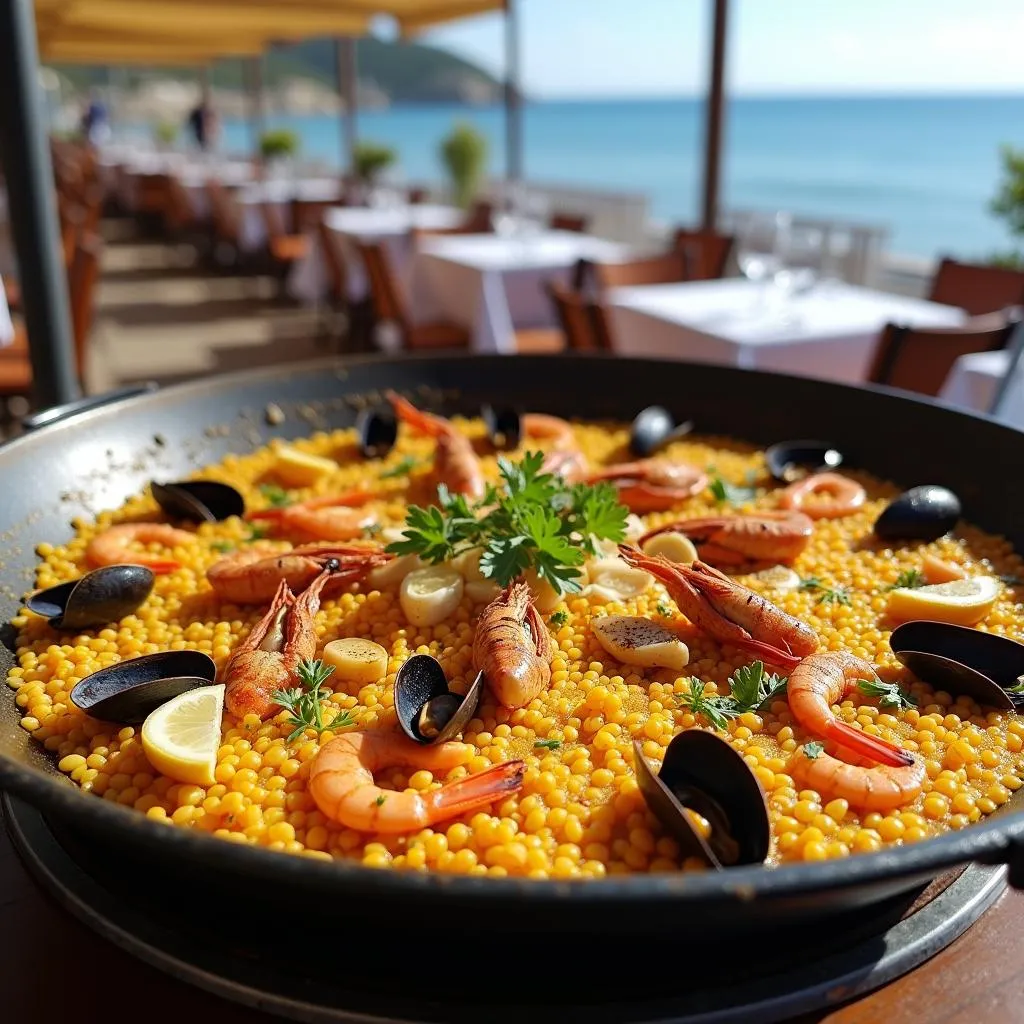The topic of describing a foreign dish is a common one in IELTS Speaking tests. It allows examiners to assess a candidate’s ability to discuss culinary experiences, cultural differences, and personal preferences. This topic has appeared frequently in past exams and is likely to remain relevant in future tests due to its universal nature and the increasing globalization of food culture.
Part 1: Introduction and Interview
In Part 1, the examiner may ask some general questions about food and eating habits. Here are some potential questions and a sample answer for one:
- Do you enjoy trying new foods?
- What’s your favorite cuisine?
- How often do you eat out?
- Have you ever tried any foreign dishes?
Let’s focus on the last question:
Examiner: Have you ever tried any foreign dishes?
Sample answer (Band 7-8):
“Yes, I have. In fact, I’m quite adventurous when it comes to trying foreign cuisines. One memorable experience was when I tasted authentic Italian pasta for the first time at a local trattoria during my trip to Rome. The al dente texture of the pasta and the rich, savory flavors of the sauce were a revelation compared to the pasta dishes I’d had back home. It really opened my eyes to how different and delicious traditional recipes can be.”
 Authentic Italian pasta dish in Rome
Authentic Italian pasta dish in Rome
Part 2: Long Turn
Cue Card
Describe a foreign dish you tried for the first time
You should say:
- What the dish was
- Where you ate it
- Who you were with
- And explain whether you liked it or not
Sample Answer (Band 6-7)
“I’d like to talk about a foreign dish I tried for the first time called sushi. It’s a Japanese dish that I had always been curious about but never had the chance to try until recently.
I ate sushi at a small Japanese restaurant in my city. It was a cozy place with traditional décor, and they had a sushi bar where you could watch the chefs prepare the food.
I went there with my best friend, who is a big fan of Japanese cuisine. She suggested we try it together because she knew I had never had sushi before.
As for whether I liked it or not, I have to say it was a mixed experience. The presentation was beautiful, with different colors and shapes arranged neatly on the plate. I tried various types of sushi, including some with raw fish, which was new to me. The taste was interesting – some pieces I enjoyed, especially the ones with cooked ingredients, but others were a bit challenging for me, particularly the texture of raw fish.
Overall, while I can’t say I loved every piece, I appreciated the experience and the chance to try something so different from my usual diet. It definitely broadened my culinary horizons, and I’m glad I gave it a try.”
Sample Answer (Band 8-9)
“I’d be delighted to share my experience of trying a foreign dish for the first time. The culinary delight I’m referring to is paella, a quintessential Spanish dish that I had the pleasure of sampling during a recent trip to Valencia, Spain.
This iconic rice dish was served at a charming seaside restaurant, nestled in the heart of Valencia, which is renowned as the birthplace of paella. The setting was absolutely picturesque, with the Mediterranean Sea as a backdrop and the tantalizing aroma of saffron wafting through the air.
I was fortunate enough to share this gastronomic adventure with my spouse and a local guide we had befriended during our travels. Their company added an extra layer of enjoyment to the experience, as our guide regaled us with the rich history and cultural significance of paella in Spanish cuisine.
As for my verdict on the dish, I was utterly captivated. The paella was a symphony of flavors and textures that danced on my palate. The rice, tinted a beautiful golden hue from the saffron, was perfectly cooked – each grain distinct yet tender. The medley of seafood, including succulent prawns and mussels, was impeccably fresh and complemented the smoky notes of the chorizo sausage. What truly elevated the dish was the coveted socarrat – the crispy layer of rice at the bottom of the pan, which our guide explained was considered a delicacy.
The experience was not just about the food itself, but also about the ritual of communal eating, as paella is traditionally shared from a single pan. This added a wonderful social dimension to the meal, making it more than just sustenance, but a celebration of Spanish culture and hospitality.
In conclusion, trying authentic paella for the first time was an unforgettable culinary epiphany. It not only tantalized my taste buds but also provided a profound insight into Spanish culture and tradition. This experience has certainly whetted my appetite for exploring more regional specialties in my future travels.”
 Traditional Spanish paella in Valencia
Traditional Spanish paella in Valencia
Follow-up Questions
- How did this experience change your perception of foreign cuisine?
- Would you recommend this dish to others? Why or why not?
Sample answer for question 1 (Band 8-9):
“This experience was truly eye-opening and significantly altered my perception of foreign cuisine. Prior to trying paella, I had a rather limited understanding of Spanish food, mostly based on stereotypes and what was available in restaurants back home. However, experiencing authentic paella in its place of origin gave me a much deeper appreciation for the complexity and richness of Spanish culinary traditions.
It made me realize that truly authentic dishes are often a product of their environment – the locally sourced ingredients, traditional cooking methods, and the cultural context all contribute to creating a unique flavor profile that can’t be fully replicated elsewhere. This experience has made me more open-minded and adventurous when it comes to trying new cuisines. I’ve come to understand that each dish tells a story about the history, geography, and culture of its origin.
Moreover, it highlighted the importance of experiencing food in its traditional setting. The ambiance of the seaside restaurant, the ritual of sharing the paella, and the insights from our local guide all enhanced the meal, transforming it from a simple act of eating into a holistic cultural experience.
This newfound perspective has ignited a passion for culinary exploration. I now approach foreign cuisines with a sense of curiosity and respect, eager to learn about the stories and traditions behind each dish. It’s also encouraged me to seek out more authentic experiences when traveling, rather than sticking to familiar foods or tourist-oriented restaurants.
In essence, this experience with paella has taught me that foreign cuisine is not just about different flavors, but about broadening one’s cultural horizons and gaining a deeper understanding of the world through the universal language of food.”
Part 3: Two-way Discussion
Examiner: Do you think it’s important for people to try foods from other cultures?
Sample answer (Band 7-8):
“Yes, I believe it’s quite important for people to experience cuisines from different cultures. Firstly, it’s a gateway to understanding diverse traditions and ways of life. Food is often deeply intertwined with a culture’s history, geography, and social customs, so trying foreign dishes can provide insights that go beyond just taste.
Moreover, exposure to various cuisines can broaden one’s palate and potentially lead to a more balanced and varied diet. Different cultures often use ingredients and cooking methods that might be unfamiliar but could be highly nutritious or offer new flavor combinations.
Additionally, in our increasingly globalized world, being open to trying foods from other cultures can foster cross-cultural understanding and appreciation. It can break down barriers and stereotypes, encouraging people to be more open-minded about differences in general.
However, it’s important to approach this with respect and an open mind. Some people might have dietary restrictions or personal preferences that limit their ability to try certain foods, and that should be respected too. The key is maintaining a curious and respectful attitude towards other culinary traditions, even if one can’t always participate fully in them.”
 Plate with diverse international dishes
Plate with diverse international dishes
Key Vocabulary and Phrases for High Scores
-
Culinary adventure /ˈkʌlɪnəri ədˈventʃə(r)/ (noun phrase): An experience of trying new and exciting foods.
Example: “Trying street food in Bangkok was a real culinary adventure.” -
Gastronomic delight /ˌɡæstrəˈnɒmɪk dɪˈlaɪt/ (noun phrase): A food or dish that gives great pleasure to eat.
Example: “The truffle pasta was an absolute gastronomic delight.” -
Palette /ˈpælət/ (noun): The range of flavors in a cuisine or dish.
Example: “Thai cuisine offers a diverse palette of sweet, sour, and spicy flavors.” -
Acquired taste /əˈkwaɪəd teɪst/ (noun phrase): Something that you may not like at first but begin to enjoy after trying it several times.
Example: “Blue cheese is definitely an acquired taste for many people.” -
Fusion cuisine /ˈfjuːʒən kwɪˈziːn/ (noun phrase): A style of cooking that combines elements from different culinary traditions.
Example: “The restaurant specializes in Asian-Latin fusion cuisine, blending flavors from both continents.”
Describe a restaurant you recently visited for more practice on discussing food-related topics in IELTS Speaking.
Examiner’s Advice
To score high in the IELTS Speaking test when describing a foreign dish:
- Use a wide range of vocabulary related to food, cooking, and cultural experiences.
- Provide detailed descriptions, including flavors, textures, and presentation of the dish.
- Discuss not just the food itself, but also the context of the experience – the setting, the company, and the cultural significance.
- Express your opinions clearly and support them with specific reasons or examples.
- Use idiomatic expressions and more complex sentence structures where appropriate.
- Practice describing different dishes and culinary experiences to improve fluency and confidence.
Remember, the key to success in the IELTS Speaking test is not just about what you say, but how you say it. Aim for clear pronunciation, natural intonation, and a steady pace. Describe a foreign food you tried for the first time to further enhance your speaking skills on this topic.


